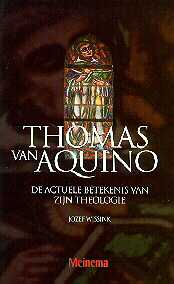Home > News > The current significance of Aquinas' Theology
The current significance of Aquinas' Theology
Some 125 persons interested attended the presentation of prof. dr. Jozef Wissink's new book Thomas van Aquino: de actuele betekenis van zijn theologie. Een inleiding (Thomas Aquinas: the current significance of his theology. An Introduction).
Prof. dr. Jozef B.M. Wissink, member of the Thomas Instituut, is Radboud professor at the University of Groningen and lectures systematic theology at the Catholic Theological University at Utrecht.
After a welcome by dr. H. Schoot, executive director of the Thomas Instituut, prof. Wissink told us about the process of writing his book, performing a threefold task: making the Aquinas approach of the Thomas Instituut accessible to a wider audience and relating it to some current theological debates. Simultaneously he intended to write an introduction into Aquinas like Pesch, Davies and Gilson (to name but a few). Prof. dr. Jozef B.M. Wissink, member of the Thomas Instituut, is Radboud professor at the University of Groningen and lectures systematic theology at the Catholic Theological University at Utrecht.
Four of Wissink's chapters are inspired by the dissertations of resp. Schoot (on Christ), van den Eijnden (on poverty), Goris (on God's foreknowledge) and Leget (on life and death). Valkenbergs study on Aquinas' use of Scripture pervades the entire book. In the other chapters one is confronted with a biography of Aquinas, some important hermeneutical remarks, the five ways, the doctrine of trinity and virtues.
After his lecture Wissink offered his book to Cardinal Adrianus Simonis, Archbisshop of Utrecht; dr. L. Winkeler, sercretary of the Thomas Fund; prof. dr. F. de Grijs, founder of the Thomas Instituut; prof. dr. H. Rikhof, leader of the Thomas Aquinas research group; dr. H. Schoot, redactor of Wissink's book; prof. dr. P. Beentjes, rector of the Catholic University at Utrecht, and some people who helped Wissink in writing common and plain Dutch.
After some kind words of thank by the Cardinal, the ceremony was continued by a lecture held by dr. A. Lascaris o.p., working at the Dominican centre of studies in Njmegen. Dr. Lascaris gave an auto-biographical account of using Aquinas within a post-modern context. He listed some seven important insights of Aquinas which continue to influence his own theological work up to the present day, and explained why he does not call himself a Thomist. For this he considers the ruptures between the days of scholasticism and post-modern culture too radical.
The afternoon was filled with two more lectures. Prof. dr. E. Hirsch Ballin, teaching international law at the Catholic University Brabant and former Minister of Justice, lectured about the current significance of Aquinas' doctrine of law. He showed how Aquinas' account of natural law gains a new significance with regard to the growing problems national governments meet in dealing with organisations and projects which transcend the borderlines of nations (like e.g. the Internet).
The last lecture of this day was held by prof. L. Heyde, teaching metaphysics and epistemology at the Philosophical Faculty of the Catholic University Nijmegen. Prof. Heyde worked out the proposition that fides and ratio, when related to one another, both change, without losing their own specific character. Carrying out this project, he considered himself to be a contemporary 'colleague' of Aquinas. After the lectures some discussion brought this intellectually satisfying and stimulating day to its completion.
dr. Carlo Leget
